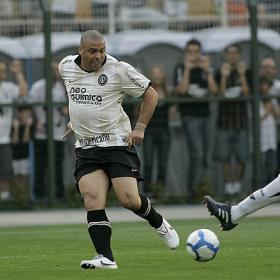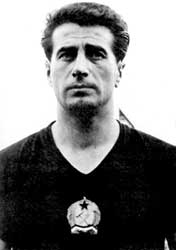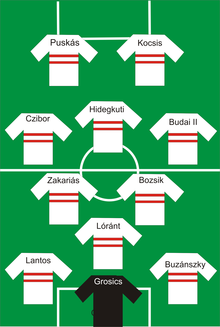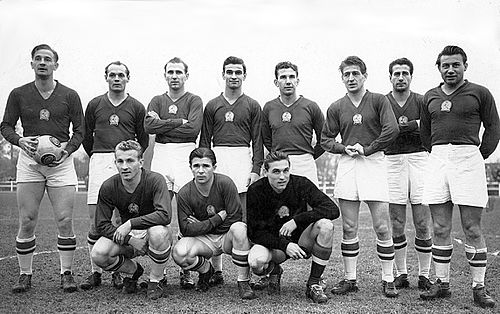HUNGARY - THE GOLDEN TEAM OF THE 1950S
HUNGARY 1954 WORLD CUP FINALIST - From left to right: Puskás, Grosics, Lóránt, Hidegkuti, Buzánszky, Lantos, Zakariás, Czibor, Bozsik, Budai and Kocsis.
The Golden Team (Hungarian: Aranycsapat; also known as the Mighty Magyars, the Marvellous Magyars, the Magnificent Magyars, or the Magical Magyars) refers to the Hungary national football team of the 1950s. It is associated with several notable matches, including the "Match of the Century" against England in 1953, and the quarter-final ("Battle of Berne") against Brazil, semi-final (against Uruguay) and final ("Miracle of Bern") of the 1954 FIFA World Cup. The team inflicted notable defeats on then-footballing world powers England, Uruguay and the Soviet Union, before the 1956 Hungarian Revolution caused the breakup of the side.
Between 1950 and 1956, the team recorded 42 victories, 7 draws and just one defeat, in the 1954 World Cup final against West Germany. Under the Elo rating system they achieved the second highest rating recorded by a national side (2166 points, June 1954), behind only Germany (2200 points, 13 July 2014).
The famous 2-3-3-2 formation employed by the side
The team is generally credited for successfully implementing an early form of "Total Football", later used by the Dutch in the 1970s. Perhaps his most revolutionary idea was that every player should be able to play in all positions; previously, each player in a team was assigned a specific position or role, usually marking a specific opposition player. The Hungarian tactic of players constantly changing roles and positions contributed greatly to the success of the team – however, it could only be introduced by using a core set of talented players who were used to playing together at both a club and national level for a period of time
The team is also generally recognized for introducing new coaching and tactical innovations, which were subsequently adopted throughout the game. It was also considered emblematic of Hungarian national success and the most important subject of national pride in the worst period of oppression by the communist regime imposed on Hungary by the Soviet Union that occupied the country in 1945. In this period any "nationalistic" or even patriotic expression was strongly disapproved since these were considered being against both the internationalist ideal of the communist government as well as the expected behavior of the Hungarian nation defeated in World War II. In this atmosphere, international sport events were the only tolerated fields of expression of national pride.
1952 Olympic Games (Yugoslavia vs. Hungary) ---> Puskas, Hidegkuti, Bozsik, Zebec, Vukas and Crnkovic on the pitch
The Hungarians arrived at the 1952 Summer Olympics unbeaten for two years. The team easily defeated opponents in the preliminary rounds, before meeting the 1948 defending Olympic champions, Sweden, in the semi-finals. Hungary demolished Sweden 6–0 to set up a final against Yugoslavia.
Goals from Ferenc Puskás and Zoltán Czibor ensured a 2–0 victory and the Olympic gold for Hungary.
1953 Central European Championship (Italy vs. Hungary)
In 1953 Hungary took part in the Central European International Cup, a nations cup for teams from Central Europe and the forerunner of the European championship. The competing teams included Austria, Czechoslovakia, Italy and Switzerland.
Hungary eased their way to a final against Italy, which they won 3–0 with a goal from Nándor Hidegkuti and two from Puskás.
1953 "Match of the Century" (England vs. Hungary)
A friendly match was arranged for 25 November 1953 against England. England had never been defeated on home soil by a team from outside the British Isles (it lost to the Republic of Ireland in 1949), and the FA were complacent – as the inventors of the game, they were assured that their players were technically and tactically superior to any other countries. At the time, England were ranked as the 3rd best team in the world; Hungary were ranked as the best team in the world. The game was eagerly anticipated; the British Press reported it as "the Match of the Century".
The game was played in front of 105,000 in Wembley Stadium. Hungary simply demolished England; they scored in the first minute, and after 27 minutes they were 4–1 up.
The final score was 6–3, with a hat-trick from Hidegkuti, two goals from Puskás and one from Bozsik. It was a footballing lesson that sent shockwaves through English football, and which ultimately caused English clubs to adopt continental coaching and tactics.
The Golden Team in 1953
front row: Mihály Lantos, Ferenc Puskás, Gyula Grosics
back row: Gyula Lóránt, Jenő Buzánszky, Nándor Hidegkuti, Sándor Kocsis, József Zakariás, Zoltán Czibor, József Bozsik, László Budai
1954 Hungary 7 England 1
England were anxious for revenge after the defeat at Wembley, and a return match was scheduled in Budapest for 23 May 1954, three weeks before the start of the 1954 World Cup. Any hopes that the Wembley game had been an aberration were immediately dispelled as Hungary tore England apart;
Hungary won 7–1, inflicting England's heaviest ever defeat.
1954 World Cup First Round Games
Hungary went to the 1954 World Cup in Switzerland as firm favourites; they were unbeaten since 1950, and had issued served notice of their ability with 6–3 and 7–1 thrashings of England.
The 16 finalists were assigned to four groups, with each group having four teams in it. Each group contained two seeded teams and two unseeded teams. Only four matches were scheduled for each group, each pitting a seeded team against an unseeded team (this contrasts with a conventional round-robin in which every team plays every other team, which would have resulted in six matches in each group). In a further oddity, extra time would be played if the teams were level after ninety minutes in the group games, with the result being a draw if the scores were still level after 120 minutes.
The top two teams from each group would qualify for the quarter finals. Hungary shared Group B with Turkey, West Germany and South Korea; Hungary and Turkey were the two seeded sides in the group.
Hungary won their opening game against South Korea 9–0, with Kocsis scoring a hat-trick. In the second game, Hungary thrashed West Germany 8–3, with Kocsis scoring another 4 goals;
however, cynical fouling on Puskás left him with a hairline fracture of the ankle which left him unavailable for selection for the quarter final and semi final stages.
1954 World Cup Quarter Final: "Battle of Berne" (Brazil vs. Hungary 1954)
Hungary met Brazil in an eagerly anticipated quarter final; both sides had a reputation for open, attacking football. The Brazilians had lost the 1950 World Cup final to Uruguay, and were anxious to reach the final again.
Unfortunately, the game was notable for the number of cynical fouls performed by both sides rather than as an exhibition of footballing technique;
Hungary took a 2–0 lead after 7 minutes, and after that the game descended into a series of fouls, free kicks and fights on the pitch resulting in three dismissals. The game ended 4–2 to Hungary. Fighting continued off the pitch in the tunnels and in the players dressing rooms.
The game's English referee Arthur Ellis commented: "I thought it was going to be the greatest game I'd ever see. I was on top of the world. Whether politics and religion had something to do with it I don't know, but they behaved like animals. It was a disgrace. It was a horrible match. In today's climate so many players would have been sent off the game would have been abandoned. My only thought was that I was determined to finish it."
1954 World Cup Semi Final (Uruguay vs. Hungary)
Uruguay were the defending champions, and had never lost a World Cup match in their history, winning both tournaments they had previously entered.
Hungary were without Puskás, but still managed to take the lead via Zoltán Czibor. Uruguay rallied but were unable to even the scores before half-time.
Almost immediately after the restart, Nándor Hidegkuti scored a second goal for Hungary. Uruguay's unbeaten World Cup record seemed to be over, but they still had most of the second half to recover.
The champions were not going to give up without a
fight, and spent much of the remainder of the match launching attack after attack at the Hungarian defence. With a quarter of an hour to play Hohberg scored for Uruguay; Hungary defended desperately until the 86th minute, when Hohberg scored his second to force extra time.
Appearing to have much more energy than their opponents, Hungary retook the lead midway through the second period of extra-time when Sándor Kocsis headed home from close range; Kocsis scored again four minutes from injury time. Uruguay were beaten 4–2, their first ever World Cup loss, while Hungary went on to their second World Cup final.
The game was in direct contrast to the quarter final between Hungary and Brazil; both Hungary and Uruguay had played attractive, attacking football in what was arguably one of the finest displays of football in a World Cup.
1954 World Cup Final: "The Miracle of Bern" (West Germany vs. Hungary)---> Puskas played despite being injured
The final was between Hungary and West Germany – the team ranked 1st in the world against a collection of amateurs that did not yet have a true national league of their own. Hungary were in their second World Cup Final (their 1938 team had lost to Italy 4–2 in
Paris); in addition, they had a record of 34 wins, 6 draws, and 1 defeat since August 1949, and were unbeaten in their last 31 matches. Hungary had beaten West Germany 8–3 in a first round game.
The only issue the Hungarians faced was the ankle injury sustained to Puskás in the same game, from which he had not fully recovered – Sebes still took the decision to play him.
Hungary took an early lead in the 6th minute, with a goal from Puskás. Two minutes later, Czibor made it 2–0 to Hungary. However, the Germans rallied, and swiftly pulled the score back to 2–1 through Max Morlock. In the 18th minute, the Germans drew level from a corner kick; the goal was scored by Helmut Rahn.
In the second half, Hungary poured forward looking to retake the lead, but their attempts were repeatedly foiled by the German defence, with goalkeeper Toni Turek pulling off several fine saves.
With six minutes left and the score still 2–2, Helmut Rahn scored West Germany's third goal. Two minutes before the end, Puskás appeared to equalise, but he was ruled off-side. The match ended Hungary's unbeaten run in one of the biggest upsets in the history of football; a team of amateurs had beaten the world's highest ranked team 3–2 in the "Miracle of Bern".
There were three controversial incidents in the final, each favouring the Germans; Hungarian goalkeeper Grosics was allegedly obstructed for the second German goal,
Puskás apparently equalised in the 89th minute but was deemed to be offside, and there was an alleged foul on Kocsis in the penalty area in the final minute of the game.
1955 Scotland 2 Hungary 4
On 8 December 1954, Scotland hosted Hungary at Hampden Park in a friendly match, before a crowd of 113,000.[5] Scotland were determined not to be humiliated as England had been a year earlier, and attempted to take the game to the Hungarians in a display of counterattacking football. This made for an open, attractive game with plenty of goals;
Hungary scored on 20 minutes through Bozsik, and Hidegkuti made it 2–0 six minutes later. Scotland rallied and pulled one back on 36 minutes through Tommy Ring, but Sandor made it 3–1 to Hungary just before halftime.
The second half continued in the same vein, with Partick Thistle winger John Mackenzie constantly beating Hungary full back Mihály Lantos. Bobby Johnstone scored a second goal for Scotland on 46 minutes, and only poor finishing prevented Scotland from equalising. The home side continued to press forward, but were caught on a counter break right at the end of the match when Kocsis scored to make the final score 2–4 to Hungary. It was the closest any team had come to beating Hungary in a friendly competition since 1950.
Afterwards, Puskas complimented the excellent work of Mackenzie, stating that he had "never seen wing play of such a high standard".
1956 Soviet Union 0 Hungary 1
On 23 September 1956, the Soviet Union played Hungary in a friendly game at the Lenin Central Stadium in Moscow, before a crowd of 102,000. The
Soviet Union were unbeaten at home, and were generally regarded as the natural successors to the Hungarians as the world's premier footballing side. In addition, the Soviet team and players were regarded as ideals of socialist principles by senior communist authorities, who expected the Soviet Union to win comfortably, as befitting the senior member of the Eastern Bloc. However, a single goal from Zoltán Czibor ended the Soviet Union's unbeaten home record; the result did little to encourage good relations between the two countries, and was a minor contributing factor to a wave of patriotic fervour that resulted in the Hungarian Revolution of 1956.












